#Cultural and Historical Role
Explore tagged Tumblr posts
Text
How Does Horoscope Impact Our Life?

Astrology, the age-old practice of predicting and interpreting future life trends through birth charts, remains a captivating subject. By analyzing planetary influences, astrologers decipher an individual’s traits, abilities, and potentials. Despite its enduring allure, astrology is a subject of debate, with some embracing it fervently while others dismiss it as unfounded. However, with the advent of online consultation for astrology, access to astrological guidance has become more convenient. Individuals can now seek astrological insights and advice from the comfort of their homes through astrology consultation services.
Visit Us: https://astrotherapists.com/how-does-horoscope-impact-our-life/
#online consultation for astrology#Scientific Skepticism#Psychological and Personal Impact#Cultural and Historical Role
0 notes
Text
people will try to treat transgender as if it is a material class of people but it functionally is not
#by multiple definitions of transgender i would be considered trans#that's why the idea of ''historic trans people'' is laughable to me#the entire concept of trans only exists within the context of a society's gender roles#therefore it can only exist as a result of misogyny#and like yes you are correct! multiple cultures throughout history have been misogynistic!
30 notes
·
View notes
Text
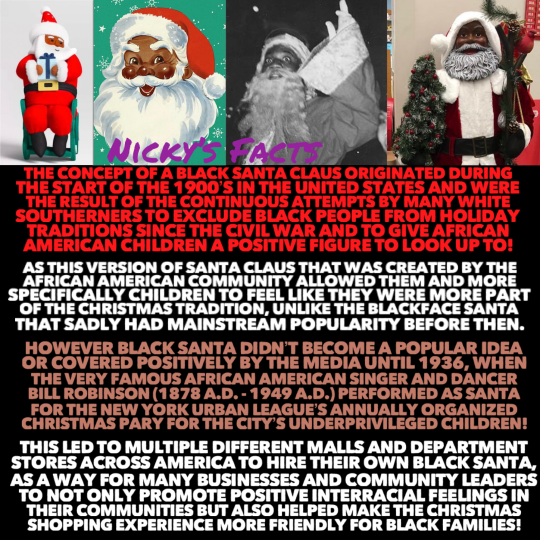
Black Santa Claus’s origin story!
❄️🎅🏾🎁
#history#happy holidays#black santa#united states#christmas#african american history#santa claus#bill robinson#holiday tradition#black christmas#christmas history#historical figures#black tumblr#role model#new york city#harlem#african american culture#childhood#black community#black excellence#soft black girls#christmas girl#holiday season#1900s#american history#christmas traditions#nickys facts
48 notes
·
View notes
Text
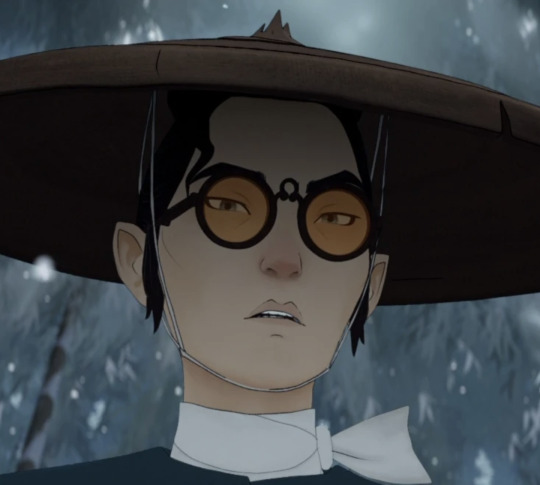
I watched all eight episodes of season 1 of Blue Eye Samurai over the weekend. I then went browsing because I wanted to read some online reviews of the show to see what people were thinking of it and also because I wanted to interact with gifs and art, as the series is visually stunning.
Yet, in my search for opinions on the show, I came across several points I'd like to address in my own words:
Mizu’s history and identity are revealed piece-by-piece and the “peaches” scene with Mizu and Ringo at the lake is intended to be a major character reveal. I think it’s weird that some viewers got angry over other viewers intentionally not gendering Mizu until that reveal, rather than immediately jumping to gender the character as the other characters in the show do. The creators intentionally left Mizu’s gender and sexuality ambiguous (and quite literally wrote in lines to lead audiences to question both) to challenge the viewer’s gut assumption that this lone wolf samurai is a man. That intentional ambiguity will lead to wide and ambiguous interpretations of where Mizu fits in, if Mizu fits in at all. But don't just take my word for this:
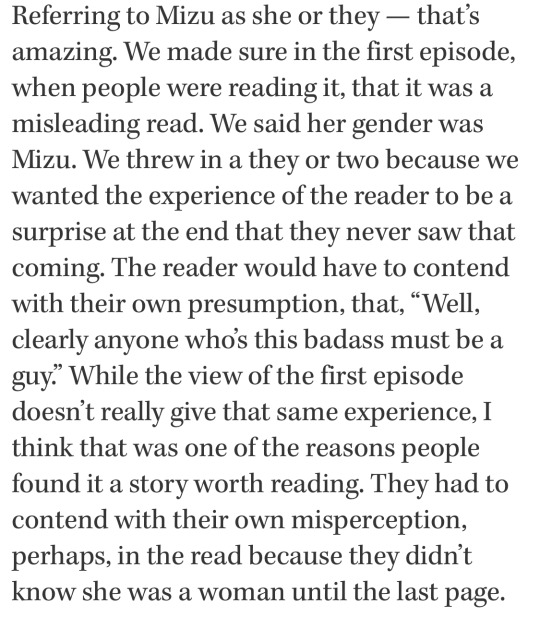
Re: above. I also think it’s weird that some viewers got upset over other viewers continuing to acknowledge that Mizu has a very complicated relationship with her gender, even after that reveal. Canonically, she has a very complicated relationship with her identity. The character is intended to represent liminality in identity, where she’s often between identities in a world of forced binaries that aren’t (widely) socially recognized as binaries. But, again, don’t just take my word for this:
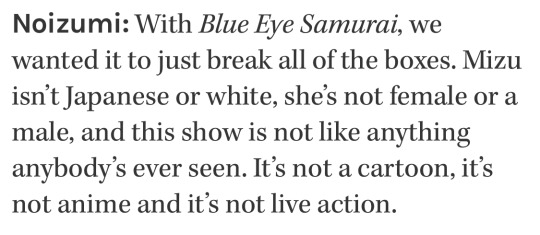
Mizu is both white and Japanese, but she is also not white and not Japanese simultaneously (too white to be Japanese and too Japanese to be white). She’s a woman and a man. She’s a man who’s a woman. She’s also a woman who’s not a woman (yet also not quite a man). But she’s also a woman; the creators said so. Mizu was raised as a boy and grew into a man, yet she was born a girl, and boyhood was imposed upon her. She’s a woman when she’s a man, a man when she’s a man, and a woman when she’s a woman.
Additionally, Mizu straddles the line between human and demon. She’s a human in the sense she’s mortal but a demon in the sense she’s not. She's human yet otherworldly. She's fallible yet greatness. She's both the ronin and the bride, the samurai and the onryō. In short, it’s complicated, and that’s the point. Ignoring that ignores a large part of her internal character struggle and development.
Mizu is intended to represent an “other,” someone who stands outside her society in every way and goes to lengths to hide this “otherness” to get by. Gender is a mask; a tool. She either hides behind a wide-brimmed hat, glasses, and laconic anger, or she hides behind makeup, her dress, and a frown. She fits in nowhere, no matter the identity she assumes. Mizu lives in a very different time period within a very different sociocultural & political system where the concept of gender and the language surrounding it is unlike what we are familiar with in our every-day lives. But, again, don’t just take my word for this:
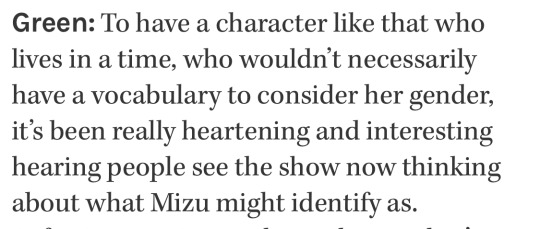
It’s also weird that some viewers have gotten upset over the fact women and queer people (and especially queer women) see themselves in Mizu. Given her complicated relationship with identity under the patriarchy and colonial violence, I think Mizu is a great character for cis-het women and queer folks alike to relate to. Her character is also great for how she breaks the mold on the role of a biracial character in narratives about identity (she’s not some great bridge who will unite everyone). It does not hurt anyone that gender-fluid and nonbinary people see themselves in Mizu's identity and struggle with identity. It does not hurt anyone that lesbians see themselves in the way Mizu expresses her gender. It does not hurt anyone that trans men see themselves in Mizu's relationship with manhood or that trans women can see themselves in Mizu when Mama forces her to be a boy. It's also really cool that cis-het women see themselves in Mizu's struggles to find herself. Those upset over these things are missing critical aspects of Mizu's character and are no different from the other characters in the story. The only time Mizu is herself is when she’s just Mizu (“…her gender was Mizu”), and many of the other characters are unwilling to accept "just Mizu." Accepting her means accepting the complicatedness of her gender.
Being a woman under the patriarchy is complicated and gives women a complicated relationship with their gender and identity. It is dangerous to be a woman. Women face violence for being women. Being someone who challenges sex-prescribed norms and roles under patriarchy also gives someone a complicated relationship with their identity. It is dangerous to usurp gender norms and roles (then combine that with being a woman...). People who challenge the strict boxes they're assigned face violence for existing, too. Being a racial or ethnic minority in a racially homogeneous political system additionally gives someone a complicated relationship with their identity. It is dangerous to be an ethnic minority when the political system is reproduced on your exclusion and otherness. They, too, face violence for the circumstances of their birth. All of these things are true. None of them take away from the other.
Mizu is young-- in her early 20s-- and she has been hurt in deeply affecting ways. She's angry because she's been hurt in so many different ways. She's been hurt by gender violence, like "mama's" misogyny and the situation of her birth (her mother's rape and her near murder as a child), not to mention the violent and dehumanizing treatment of the women around her. She's been hurt by racial violence, like the way she has been tormented and abused since childhood for the way she looks (with people twice trying to kill her for this before adulthood). She's been hurt by state-sanctioned violence as she faces off against the opium, flesh, and black market traders working with white men in contravention of the Shogun's very policies, yet with sanction from the Shogun. She's been hurt by colonial violence, like the circumstances of her birth and the flood of human trafficking and weapons and drug trafficking in her country. She's had men break her bones and knock her down before, but only Fowler sexually differentiated her based on bone density and fracture.
Mizu also straddles the line between victim and murderer.
It seems like Mizu finding her 'feminine' and coming to terms with her 'female side' may be a part of her future character development. Women who feel caged by modern patriarchal systems and alienated from their bodies due to the patriarchy will see themselves in Mizu. They understand a desire for freedom that the narrow archetypes of the patriarchy do not afford them as women, and they see their anger and their desire for freedom in Mizu. This, especially considering that Mizu's development was driven by one of the creators' own experiences with womanhood:
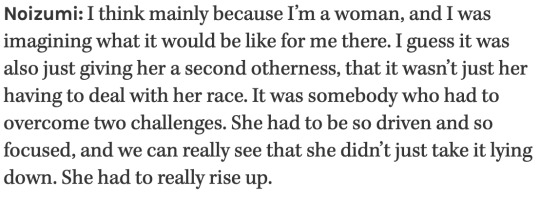
No, Mizu does not pass as a man because she "hates women" or because she hates herself as a woman or being a woman. There are actual on-screen depictions of Mizu's misogyny, like her interactions with Akemi, and dressing like a man is not an instance of this. Mizu shows no discomfort with being a woman or being seen as a woman, especially when she intends to pass herself as and present as a woman. Mizu also shows the women in the series more grace and consideration than any man in the show, in whatever capacity available to her socially and politically, without revealing herself; many of the women have remarked that she is quite unlike other men, and she's okay with that, too.
When she lives on the farm with Mama and Mikio, Mizu shows no discomfort once she acclimates to the new life. But people take this as conclusive evidence of the "only time" she was happy. She was not. This life was also a dance, a performance. The story of her being both the ronin and the onryō revealed to the audience that this lifestyle also requires her to wear a mask and dance, just as the bride does. This mask is makeup, a wedding dress, and submission, and this performance is her gender as a wife. She still understands that she cannot fully be herself and only begins to express happiness and shed her reservation when she believes she is finally safe to be herself. Only to be betrayed. Being a man is her safety, and it is familiar. Being a boy protected her from the white men as a child, and it might protect her heart now.
Mizu shows no discomfort with being known as a woman, except when it potentially threatens her goals (see Ringo and the "peaches" scene). She also shows no discomfort with being known as, seen as, or referred to as a man. As an adult, she seems okay- even familiar- with people assuming she's a man and placing her into the role of a man. Yet, being born a girl who has boyhood violently imposed upon her (she did not choose what mama did to her) is also an incredibly important part of her lived experience. Being forced into boyhood, but growing into a man anyway became part of who she is. But, being a man isn’t just a part of who she became; it’s also expedient for her goals because men and women are ontologically different in her world and the system she lives under.
She's both because she's neither, because- ontologically- she fits nowhere. When other characters point out how "unlike" a man she is, she just shrugs it off, but not in a "well, yeah, because I'm NOT a man" sort of way, but in an "I'm unlike anyone, period," sort of way. She also does not seem offended by Madam Kaji saying that Mizu’s more man than any who have walked through her door.
(Mizu doesn’t even see herself as human, let alone a woman, as so defined by her society. And knowing that creators have stated her future arc is about coming into her “feminine era” or energy, I am actually scared that this show might fall into the trope of “domesticating”/“taming” the independent woman, complete with an allegory that her anger and lack of human-ness [in Mizu’s mind] is a result of a woman having too much “masculine energy” or being masculine in contravention of womanness.)
Some also seem to forget that once Mama and Mikio are dead, no one knows who she is or where she came from. They do not have her background, and they do not know about the bounty on her (who levied the bounty and why has not yet been explained). After their deaths, she could have gone free and started anew somehow. But in that moment, she chose to go back to life as a man and chose to pursue revenge for the circumstances of her birth. Going forward, this identity is no longer imposed upon her by Mama, or a result of erroneous conclusions from local kids and Master Eiji; it was because she wanted people to see her as a man and she was familiar with navigating her world, and thus her future, as a man. And it was because she was angry, too, and only men can act on their anger.
I do think it important to note that Mizu really began to allow herself to be vulnerable and open as a woman, until she was betrayed. The question I've been rattling around is: is this because she began to feel safe for the first time in her life, or is this part of how she sees women ontologically? Because she immediately returns to being a man and emotionally hard following her betrayal. But, she does seem willing to confide in Master Eiji, seek his advice, and convey her anxieties to him.
Being a man also confines Mizu to strict social boxes, and passing herself as a man is also dangerous.
Mizu doesn't suddenly get to do everything and anything she wants because she passes as a man. She has to consider her safety and the danger of her sex being "found out." She must also consider what will draw unnecessary attention to her and distract her from her goals. Many viewers, for example, were indignant that she did not offer to chaperone the mother and daughter and, instead, left them to the cold, only to drop some money at their feet later. The indignity fails consider that while she could bribe herself inside while passing as a man, she could not bribe in two strangers. Mizu is a strange man to that woman and does not necessarily have the social position to advocate for the mother and daughter. She also must consider that causing small social stirs would distract from her goals and draw certain attention to her. Mizu is also on a dangerous and violent quest.
Edo Japan was governed by strict class, age, and gender rules. Those rules applied to men as well as women. Mizu is still expected to act within these strict rules when she's a man. Being a man might allow her to pursue revenge, but she's still expected to put herself forward as a man, and that means following all the specific rules that apply to her class as a samurai, an artisan (or artist), and a man. That wide-brimmed hat, those orange-tinted glasses, and her laconic tendencies are also part of a performance. Being a boy is the first mask she wore and dance she performed, and she was originally (and tragically) forced into it.
Challenging the normative identities of her society does not guarantee her safety. She has limitations because of her "otherness," and the transgression of sex-prescribed roles has often landed people in hot water as opposed to saving them from boiling. Mizu is passing herself off as a man every day of her life at great risk to her. If her sex is "found out" on a larger scale, society won’t resort to or just start treating her as a woman. There are far worse fates than being perceived as a woman, and hers would not simply be a tsk-tsk, slap on the wrist; now you have to wear makeup. Let's not treat being a woman-- even with all the pressures, standards, fears, and risks that come with existing as a woman-- as the worst consequence for being ‘found out’ for transgressing normative identity.
The violence Mizu would face upon being "found out" won’t only be a consequence of being a "girl." Consider not just the fact she is female and “cross-dressing” (outside of theater), but also that she is a racial minority.
I also feel like many cis-het people either ignore or just cannot see the queerness in challenging gender roles (and thus also in stories that revolve around a subversion of sex-prescribed gender). They may not know how queerness-- or "otherness"-- leads to challenging strict social stratifications and binaries nor how challenging them is seen by the larger society as queer ("strange," "suspicious," "unconventional," even "dishonorable," and "fraudulent"), even when "queerness" (as in LGBTQ+) was not yet a concept as we understand it today.
Gender and sexuality- and the language we use to communicate who we are- varies greatly across time and culture. Edo Japan was governed by strict rules on what hairstyles, clothes, and weapons could be worn by which gender, age, and social group, and this was often enshrined in law. There were specific rules about who could have sex with whom and how. These values and rules were distinctly Japanese and would not incorporate Western influences until the late 1800s. Class was one of the most consequential features to define a person's fate in feudal Japan, and gender was quite stratified. This does not mean it's inappropriate for genderqueer people to see themselves in Mizu, nor does this mean that gender-variant identities didn’t exist in Edo Japan.
People in the past did not use the same language we do today to refer to themselves. Example: Alexander The Great did not call himself a "bisexual." We all understand this. However, there is a very weird trend of people using these differences in language and cultures across time to deny aspects of a historical person's life that societies today consider taboo, whether these aspects were considered taboo during that historical time period or not. Same example: people on Twitter complaining that Netflix "made" Alexander The Great "gay," and after people push back and point out that the man did, in fact, love and fuck men, hitting back with "homosexuality wasn't even a word back then" or "modern identity didn't exist back then." Sure, that word did not exist in 300s BCE Macedonia, but that doesn't mean the man didn't love men, nor does that mean that we can't recognize that he'd be considered "queer" by today's standards and language.
Genderqueer, as a word and as the concept is understood today, did not exist in feudal Japan, but the people did and feudal Japan had its own terms and concepts that referred to gender variance. But while the show takes place in Edo Japan, it is a modern adult animation series made by a French studio and two Americans (nationality). Mizu is additionally a fictional character, not a historical figure. She was not created in a vacuum. She was created in the 21st century and co-written by a man who got his start writing for Sex in the City and hails from a country that is in the midst of a giant moral panic about genderqueer/gender-variant people and gender non-conforming people.
This series was created by two Americans (nationality) for an American company. In some parts of that country, there are laws on the book strictly defining the bounds of men and women and dictating what clothes men and women could be prosecuted for wearing. Changes in language and identity over time mean that we can recognize that if Mizu lived in modern Texas, the law would consider her a drag performer, and modern political movements in the show creators' home country would include her under the queer umbrella.
So, yeah, there will also be genderqueer people who see themselves in Mizu, and there will be genderqueer fans who are firm about Mizu being queer to them and in their “headcanons.” The scene setting being Edo Japan, does not negate the modern ideas that influence the show. "Nonbinary didn't exist in Edo Japan" completely ignores that this show was created to explore the liminality of modern racial, gender, class, and normative identities. One of the creators was literally inspired by her own relationship with her biracial identity.
Ultimately, the fact Mizu, at this point in her journey, chooses to present and pass as a man and the fact her presented gender affects relationship dynamics with other characters (see: Taigen) gives this story a queer undertone. And this may have been largely unintentional: "She’s a girl, and he’s a guy, so, of course, they get together," < ignoring how said guy thinks she’s a guy and that she intentionally passes herself as a guy. Audiences ARE going to interpret this as queer because WE don’t live in Edo-era Japan. And I feel like people forget that Mizu can be a woman and the story can still have queer undertones to it at the same time.
#Blue Eye Samurai#‘If I was transported back in time… I’d try to pass myself off as a man for greater freedom.’#^^^ does not consider the intersection of historically queer existence across time with other identities (& the limitations those include)#nor does it consider the danger of such an action#I get it. some come to this conclusion simply because they know how dangerous it is to be a woman throughout history.#but rebuking the normative identities of that time period also puts you at great risk of violence#challenging norms and rules and social & political hierarchies does not make you safer#and it has always been those who exist in the margins of society who have challenged sociocultural systems#it has always been those at greatest risk and who've faced great violence already. like Mizu#Anyway... Mizu is just Mizu#she is gender queer (or gender-variant)#because her relationship with her gender is queer. because she is gender-variant#‘queer’ as a social/political class did not exist. but people WE understand as queer existed in different historical eras#and under different cultural systems#she’s a woman because queer did not exist & ‘woman’ was the sex caste she was born into#she’s also a woman because she conceptualizes herself as so#she is a woman AND she is gender-variant#she quite literally challenges normative identity and is a clear example of what sex non-conforming means#Before the actual. historic Tokugawa shogunate banned women from theater#there were women in the theater who cross-dressed for the theater and played male roles#so I’m also really tired of seeing takes along the lines of: ‘Edo Japan was backwards so cross dressers did’t exist then!’#like. please. be more transparent won’t you?
21 notes
·
View notes
Text
Absolutely death gripped clenched trying not to comment on reductive posts on ancient greek homosexual relationships
#It is neither wholly '0mg two gay guys in love!!' and 'I am humiliating and debasing a lower man by making a woman out of him'#There's heavy elements of that in how they conceptualized penetrator vs penetrated but the erastes (lover/protector) and eromenos (beloved)#relationship was significantly more complex than that#Like it is conceptualized as sort of a mentor/mentee relationship and a positive element for an adolescent's development#It was the subject of romantic plays and you get things like people in antiquity in heated debates over who is the#erastes and who is the eromenos between Achilles and Patroclus (to better depict them in plays)#The bottom line is more 'the socially accepted m/m relationships were (what we would now consider) an adult and a child#(or young man) with the age difference being a fundamental element to the dynamic.'#And more broadly being penetrated in sex assigned a 'lower' or 'womanly' role and it would not be conventionally accepted#for an older/more socially powerful man to recieve penetration (which certainly DID happen though)#So absolutely a moment in the history of male homosexuality and not something to just go 'ew ew bad evil ewwie' about but also#not something you want to project modern conceptions of LGBT identity upon#Also we know relatively little about relationships between women in ancient Greece due to lack of sources due to being a#highly patriarchal culture but we can't actually know that they did not involve similar power dynamic#Certainly not to the same extent or in such a well socially defined way (bc they conceptualize sex almost entirely through a lens of#penetration) but I think you should be treating relations between ancient Greek women with the same degree of#historical distance from our lives and identities today.#Ok death grip failed I just typed an entire rant. Fiuck it
58 notes
·
View notes
Text
listen if we brat summer our way out of fascism I'll fuckin take it
#ravi rants#historically speaking the best way to shut down asshats that violate the social contract of tolerance is to mock them#idk man maybe I have a different perspective on all of this because I'm part of the desi diaspora#but like.... so Indians won't always obviously call out violations of social decorum#if you're making an idiot of yourself or you're making a scene. other people will stand by and let you do it.#my therapist and I talk about me coming from a high-context Asianic cultural background like I do a lot actually#because the thing about Indian decorum is that. like.#one. you protect yours. if your friend is actively intervening in on something there's a reason and it might be helpful#but two. if someone's breaking decorum.... we allow them to do so in order to figure out why.#if someone's ex is crashing a wedding and successfully gets the floor they'll get heard out#and everyone will be paying attention#because the thing is those kinds of overt violations of decorum usually happen for a reason....#Indian soap operas are A Lot™ but listen. a party might be the right time to call someone out on being abusive or manipulative#because the whistleblower can be escorted away to safety by them and theirs.#and usually you have to be able to know enough decorum to get to the point where you make a scene#and Indians respect the hustle. we'll hear you out.#the Hindu gods are notorious for being like 'alright smart guy. here's your wish.'#the gods will readily admit if they've been outwitted#but you're an idiot if you think you'll get away with fucking with the natural chaos of samsara and karma forever :)#however. there's also Hindu parables of asuras and dumbass humans realizing they fucked up and taking the L with grace#and the gods respect that#but lol. fascists aren't respectful.#Richard Spencer shut the fuck up after we all saw him get punched#conservatives are having a mental breakdown over being called weird while insisting that a cis woman is a man#and I'd like to remind everyone that the social role of a court jester is to keep everyone humble#bc dude. if you're getting butthurt over the clown ribbing you. maybe calm the fuck down? look in the mirror?#you may be a king but the larger the seat you hold#the better your toilet plumbing should be
7 notes
·
View notes
Text

My future home will have a bed like this 🩷
#girly#girly aesthetic#vintage#vintage bedroom#historical#historical bedroom#castle#polish culture#polish history#niedzica#castle niedzica#polish castle#future home#traditional blog#traditional lifestyle#traditional values#traditional fashion#traditional femininity#traditional gender roles#tradwife#trad wives#tradwife aesthetic#tradwife in training#homemaking#homemaker#homemaker in training
3 notes
·
View notes
Text
not me adding literal buddhist monk shaolin masters to my very short list of ppl I’ve ever strongly related to the philosophy/mentality/approach to life of oh boy
#anthony padilla#buddhist monks#philosophy#trans#Idk what this says abt me for any of you who don't know me that well yet lmao#but it is fascinating to me at least that between the discipline of language learning since childhood#my shonen protagonist energy and slight megalomania#and my nonbinary trans thoughts about physical change and self improvement etc etc etc#despite coming from such vastly different backgrounds (not just culturally just in the like- I'm a queer artist n educator n stuff#and they're literal monks in an organised religion/belief system)#we have still somehow arrived at so many similar not only beliefs but also just like ways of living and discipline and worldview#something something outsider perspective that queer people will be more prone to due to being an eternal minority in any part of the world#while ppl like monks/nuns take up the lifestyle they lead in order to alienate themselves from the rest of society for religion's sake#something something the historic connection between ppl who dedicate their life to religion (monks/nuns/priests/etc) and the queer community#and various cultures where genderqueer ppl's role is/was that of religious leaders#something something maybe in a changing world that is not as religious anymore we can still be advisors and wise ppl to consult#like I think that's literally the conclusion I've arrived at for my pitch to the feminists is#you will never truly manage to include us as equals for sheer numbers reasons so you might as well use us and our skills and insights#for the gender lib movement in other more distinct ways that neither need you to fully equate us to you nor to limit us to your part of it#pay the transfemmes to teach y'all coding karlie kloss can't do it all on her own#and pay me to come teach you abt transmasc inclusion and internalised misandry and the terfs#and you'll find plenty of use from having us around
6 notes
·
View notes
Text
Karaites: What is their significance in Turkic culture?
History of the Karaites Significance of the Karaites Religion, Identity, and Language Preservation Efforts and Contemporary Challenges Conclusion Video: The Karays (Torah Karaite Turks)You may also like The Karaites, also known as Krymkaraylar, hold a significant place in Turkic culture due to their unique heritage and religious practices. This article delves into the origins, history, and…
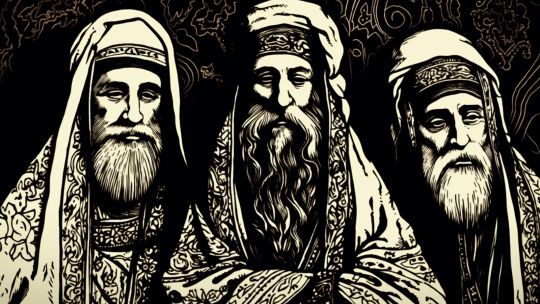
View On WordPress
#Contributions of Karaites to Turkic heritage#Historical importance of Karaites#Karaites and their cultural significance#Karaites as a minority group in Turkic culture#Karaites in Turkic culture#Karaites&039; impact on the diversity of Turkic cultural tapestry#Karaites&039; influence on Turkic languages and customs#Karaites&039; religious and cultural practices#Karaites&039; role in Turkic traditions#Preservation of Karaites&039; traditions in Turkic culture
5 notes
·
View notes
Text

In relation to my dream about a BBxBath&Body Works collab mentioned here
@tsubakis-wings-of-faith
That sounds lovely! Between your comment and the one from @cutesymortician now I've started to seriously think about it... I definitely love the idea of a floral scent for Tsubaki, given her name, character theming, etc.
I wonder if it would be a softer scent to symbolize her elegance and the famous 'scentlessness' of the Camellia flower, or if it would be a stronger scent as reference to her strong convictions and dedication...
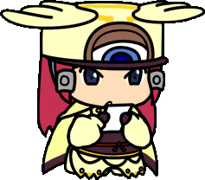
#bb meta#tsubaki yayoi#I know the camellia flower is used in tea production but I don't think tea is the right smell for tsubaki#though I guess there are a lot of different scents to tea too... I'm really not familiar with uh aromachology#but now I want to be to form some really in depth ideas for this lol#novus orbis librarium#duodecim#ao no kokagami#I associate Tsubaki with lillies too and I also think the cherry blossom would be a good flower for her#as they're often tied to Japanese culture femininity and elegance#which I think fit Tsubaki very very well#especially the more you look into the historical roles of samurai or noble femininity#idk I'm rambling now
3 notes
·
View notes
Text
Announcing H.A.I.A.N: The Pillow Book, An Interactive Game Journey Through Haian-Era Japan
Synopsis “H.A.I.A.N” is a narrative-driven game set in Heian Japan, where players take on the role of Saki, a young court lady trying to rise in rank and status through spreading rumors and navigating the complex social hierarchy of the court. As Saki, players must make decisions that can either advance or hinder their progress, as well as complete side quests that involve traditional Japanese…
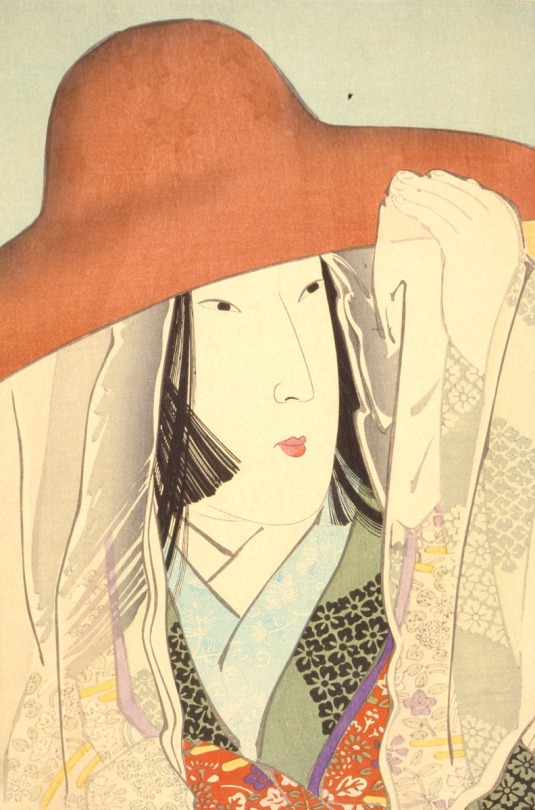
View On WordPress
#Artistic Pursuits#Betrayal#Buddhist Practices#Choice Matters#Court Games#Court Politics#Courtly Love#Deception#Falling Rank#Forbidden Love#Friendship#Gender Roles#Heian Court Life#Historical Fiction#Influence#Interactive Narrative#Intrigue#japanese culture#japanese history#Japanese Traditions#Japanophile#Lady Murasaki#Manipulation#Power Struggles#Rising Rank#Rumor Mill#Sei Shonagon#Shinto Worship#visual novel
3 notes
·
View notes
Text
knowing what i know about roman history (which is a lot), i keep thinking there's no way this whole thing was not propaganda made up by later writers. emperors were absolutely not above criticism or downright character assassination, especially if they pissed people off as much as elgabalus did during his reign.
there's this added layer: while homosexual relationships between men were not a huge deal in roman society, their conception of those relationships was very different to ours. it wasn't about orientation, being gay or bisexual, but about penetrator and penetrated. being the one who did the penetrating was seen as fine and good and masculine, while being the one who was penetrated was seen as weak, shameful, feminine. femininity in men was highly frowned upon and treated with a weird mixture of disdain, fascination, revulsion, and derision.
all this to say that cassius dio was most likely not writing the line highlighted above as plain objective fact. the average roman, reading that line, would have known exactly how to interpret it: elgabalus was a feminine man, feminine to the point of seeing himself as a woman, which made him wrong in the head and not to be trusted. a man who had willingly given up his virtus, or masculine virtue.
this is not a trans positive story, or even really a story about a trans person at all. we don't even know if what cassius dio said was true. we don't know what elgabalus thought of himself when it comes to what modern people would describe as orientation and gender identity. it is wild to me that the museum is running in this direction with this. downright ahistorical, honestly.

I bring you… my silly little comics. Saw a tik tok this morning about British Museum recognizing emperor Elagabalus as a trans woman 🏳���⚧️, and I just had to draw this.
#this is simplified because i obviously don't have the space to get into ancient roman concepts of gender roles etc#or the way roman writers understood the interpretation of history and historical fact#but the basics are there#it's strange to me that so many people don't seem to understand that to understand historical people#you have to first understand how those people thought#because it is guaranteed that while we can relate to just about anyone if we try hard enough#that modes of thinking shift and change throughout history#from time period to time period#culture to culture#region to region#if you approach historical writing etc through solely a modern lens you are not going to get the whole picture#and are going to interpret things poorly#etc etc etc#history nerd shit
74K notes
·
View notes
Text

Israel doesn’t represent the Jewish people, nor is it antisemitism to criticize israel or be anti zionist!
🇵🇱✡️🇵🇱
#history#marek edelman#warsaw#poland#anti zionisim#jewish history#hero#resistance fighters#isreal#historical figures#world war 2 history#activist#zob#warsaw ghetto#free palestine#free gaza#polish history#holocoust#jewish culture#warsaw uprising#palestine#ww2#warsaw ghetto uprising#role model#world war 2#nickys facts
17 notes
·
View notes
Text
Opinion | Lessons from Alexandria: A Cautionary Tale for Modern American Politics
By Jet Espinosa In a city once hailed as a beacon of knowledge and tolerance, Alexandria drew people from across the ancient world. It was a place where scholars, thinkers, and believers from diverse backgrounds came to share and preserve their wisdom. With libraries that housed invaluable knowledge in science, philosophy, medicine, and the arts, Alexandria was a symbol of progress and…

View On WordPress
#Alexandria library destruction#American democracy#Ancient Alexandria#Cultural diversity#Enlightenment and progress#Freedom of belief#Historical cautionary tales#History repeating itself#Intellectual freedom#Knowledge and tolerance#Lessons from ancient civilizations#Lessons from history#Modern American politics#Political power and religion#Politics and religion#Protecting democracy#Religious influence in politics#Religious tolerance#Role of religion in government#Separation of church and state
0 notes
Text
Discovering Bulgaria: A Comprehensive Travel Guide
Nestled in Southeast Europe, Bulgaria is a gem that offers a rich blend of history, culture, and natural beauty. From ancient ruins and stunning landscapes to vibrant cities and delicious cuisine, Bulgaria has something for every traveler. This guide will provide you with everything you need to know for an unforgettable trip to this enchanting country. A Brief History of Bulgaria Bulgaria’s…

View On WordPress
#A Brief History of Bulgaria#a visa may be required. Always check the latest visa regulations before traveling.#Accommodation Affordability Bulgaria offers a wide range of accommodations#Activities for Tourists in Bulgaria#adventure#africa#Airports and Infrastructure in Bulgaria#allowing travelers to enjoy a high-quality experience without breaking the bank.#among others#and Australia#and Burgas. Bulgaria has a well-developed public transport system#and democratic transition#and entertainment are reasonably priced#and festivals playing a significant role in everyday life.#and grilled meats. Don’t miss trying traditional dishes like tarator (cold cucumber soup) and moussaka. Q: Can I use my credit card in Bulga#and historical landmarks like Alexander Nevsky Cathedral. Plovdiv: One of the oldest continuously inhabited cities in the world#and kebapche (grilled meat). Cultural life is vibrant#and natural beauty. From ancient ruins and stunning landscapes to vibrant cities and delicious cuisine#and Protestantism.#and restaurants. However#and Romans leaving their mark. Established in 681 AD#and stunning landscapes#and trains. The road network is extensive#attracting students from across Europe and beyond.#Bulgaria boasts a well-established education system#Bulgaria has been a member of the European Union since 2007. Q: What is the local cuisine like? A: Bulgarian cuisine features fresh vegetabl#Bulgaria has something for every traveler. This guide will provide you with everything you need to know for an unforgettable trip to this en#Bulgaria is a democratic republic and a member of the European Union and NATO#Bulgaria is a gem that offers a rich blend of history#Bulgaria is generally safe for tourists
0 notes
Text
Jade Ann Byrne Tyme Myge Pyrtal Across Dimensions & Prospectives: The Past Lives of 1809 Jade Ann Byrne
Jade Ann Byrne a timeless figure existing across dimensions and realities. Jade Ann Byrne Tyme Myge Pyrtal Across Dimensions & Perspectives: The Past Lives of 1806m Jade Ann Byrne In the ethereal folds of time and space, where dimensions intertwine and realities converge, there exists an entity both singular and plural—a nexus of existence known as Jade Ann Byrne. Through the Tyme Myge Pyrtal,…

View On WordPress
#California frontier women#California history#comparing cultural norms#connecting past and present#cultural heritage#empowerment in different eras#empowerment through ages#fashion and culture#fashion evolution#French history#historical blog topics#historical fashion#historical insights#historical women&039;s fashion#Jade Ann Byrne#Jade Byrne legacy#multidimensional characters#Napoleonic era#Parisian women 1809#societal expectations#time travel fiction#timeless narratives#transcending dimensions#universal women&039;s struggles#women in history#women&039;s rights 1809#women&039;s roles in 1809
1 note
·
View note